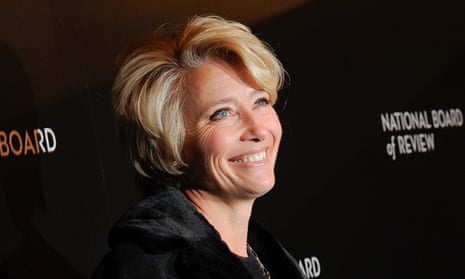The Oscar-winning actor Emma Thompson has spoken out about ageism and the lack of opportunities for women in the acting industry, saying “sexism and unpleasantness” was worse than ever.
The Sense and Sensibility and Nanny McPhee star said the world was in a “worse state than I have known it, particularly for women”.
Thompson is the latest female actor to speak out about sexism in television and film, following comments by stars including Maggie Gyllenhaal, Helen Mirren and director Jane Campion.
“I don’t think there’s any appreciable improvement and I think that, for women, the question of how they are supposed to look is worse than it was even when I was young,” she told the new issue of Radio Times. “So, no, I am not impressed, at all. I think it’s still completely shit, actually.”
Thompson said: “When I was younger I really did think we were on our way to a better world and when I look at it now, it is in a worse state than I have known it, particularly for women and I find that very disturbing and sad.
“So I get behind as many young female performers as I can and actually a lot of the conversations with them are about exactly the fact that we are facing and writing about the same things and nothing has changed, and that some forms of sexism and unpleasantness to women have become more entrenched and indeed more prevalent.”
Thompson, 56, plays a 77-year-old prostitute in her latest project, The Legend of Barney Thomson, opposite co-star Robert Carlyle (Trainspotting, The Full Monty) who is also the film’s director.
“It is a bit ageist,” said Thomson. “It would be really nice to get someone who is actually 77 to play her, but it’s a wildly comic role and I couldn’t resist.”
It is not the first time Thompson, who won an Oscar for her 1995 adaptation of Jane Austen’s Sense and Sensibility, has addressed the issue.
Publicising her Disney film Saving Mr Banks two years ago, she said there was a period in her 30s when she was offered “a whole string of roles that basically involved saying to a man: ‘Please don’t go and do that brave thing. Don’t! No, no, no!’
“That’s a trope, the stock woman who says: ‘Don’t do the brave thing.’ I said no to all of them. I’m so proud.” She added: “What the ding-dong heck is going on if this is still something we’re talking about?”
Gyllenhaal, star of BBC2 drama The Honourable Woman, said earlier this year that she was told by a Hollywood producer that she was too old, at 37, to play the love interest of a 55-year-old man.
“It was astonishing to me,” she said. “It made me feel bad, and then it made me feel angry, and then it made me laugh.”
Her comments prompted research which showed that female leads in Hollywood movies were on average four and a half years younger than their male counterparts.
Prime Suspect star Helen Mirren said sexism and ageism against older female actors in the film industry was “fucking outrageous”. Responding to Gyllenhaal’s comments in June, Mirren said: “It’s ridiculous, and twas ever thus.
“We all watched James Bond as he got more and more geriatric, and his girlfriends got younger and younger. It’s so annoying.”
Jane Campion, director of The Piano and BBC2’s Elisabeth Moss drama Top of the Lake, last year said there was “inherent sexism” in the film industry.
“It’s not that I resent the male film-making, but there is something that women are doing that we don’t get to know enough about,” she said.
Thompson said she would take her 15-year-old daughter, Gaia, to this summer’s Edinburgh festival for the first time to watch a couple of her friends, Lily Bevan and Jessica Butcher, perform one-woman shows.
“It means a lot to me because that is what I did and I want my daughter to have a look at that and say: ‘Oh, that’s one way of expressing what you need to express’,” she told the listings magazine.
“I think she looks around at the prevailing culture and thinks: ‘None of that really applies to me and I don’t get it’ – the magazines, the ‘figure’ culture and the handbags – it’s just absolutely meaningless. So I can’t wait for her to see these women writer/performers.”
The BBC Trust, in the corporation’s annual report last week, said the BBC had to do more to put more women on television, as well as tackle a lack of black, Asian and minority ethnic actors on-screen.
It was followed by the government’s green paper on the future of the BBC two days later, which also said it had to do more to reflect the makeup of its audience.

Comments (…)
Sign in or create your Guardian account to join the discussion